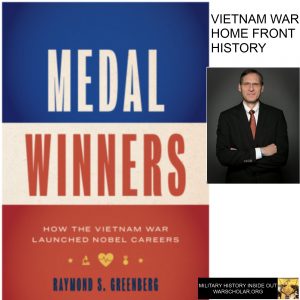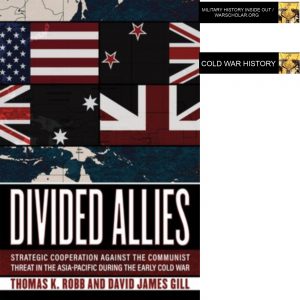Podcast: Play in new window | Download
Subscribe: RSS
How the NIH developed US scientists like Anthony Fauci and Nobel prize winners during the Vietnam War – Interview with Raymond Greenberg
Check out this book here https://amzn.to/3hMKfcL
Interview Timeline
Raymond Greenberg has spent decades in the field of medicine. He recently wrote a book on Nobel prize winners who worked at the National Institutes of Health during the Vietnam War. We spoke about the book, military medicine, WWII, the Vietnam War, and the process of getting the book published. Medal Winners (University of Texas Health Press, 2020)
0:52 – Ray talks about his interest in the history of Nobel laureates.
2:26 – Ray talks about the term “Yellow Beret”
6:30 – Ray talks about the research that these scientists worked on at NIH.
7:29 – Ray talks about the Naval Medical Hospital.
8:07 – Ray talks about Dr. Anthony Fauci’s connection to these programs.
8:44 – Ray talks about tropical diseases and war.
9:52 – Ray talks about the obligations these doctors had when drafted.
12:09 – Ray talks about the “golden age” of physicians doing research.
15:39 – Ray talks about the unintended effects of the draft in developing new scientists and medicine.
18:11 – Ray talks about Dr. Fauci’s involvement with anthrax issues after 9/11.
19:46 – Ray talks about alternatives the military created to the doctors’ draft including the Uniformed Services Medical School.
22:00 – Ray talks about how the book is divided into pre-NIH years, the time the scientists spent at the NIH, and then their Nobel prizes.
24:44 – Ray talks about medical advances made during the Vietnam War including rapid evacuation.
26:00 – Ray talks about how he researched the book including interviews with the Nobel prize winners.
27:52 – Ray talks about when people understood the nexus between NIH and the Nobel prize winners.
31:24 – Ray talks about how the end of the Vietnam War negatively affected the NIH.
34:20 – Ray talks about applications to the Uniformed Health Services.
36:20 – Ray talks about foreign doctors at NIH.
37:30 – Ray talks about Vietnamese scientists during the Vietnam War.
38:18 – Ray talks about the interviewing process.
38:56 – Ray talks about the winners’ feelings about having been in the program.
42:29 – Ray talks about the cultural benefits of working at the NIH during the Vietnam War.
45:26 – Ray talks about the purpose of the NIH and how it was expanded during WWII to develop combat advantages. One concern was German biomedical advances to create better fighters.
49:09 – Ray talks about how WWII was a major turning point in the development of smart warfare.
53:03 – Ray differentiates between doctors and scientist-doctors.
57:28 – More information on Ray’s can be found on the University of Texas Press website.
Links of interest
https://utpress.utexas.edu/books/greenberg-medal-winners
For more “Military History Inside Out” please follow me at www.warscholar.org, on Facebook at warscholar, on twitter at Warscholar, on youtube at warscholar1945 and on Instagram @crisalvarezswarscholar. Or subscribe to the podcast on Apple Podcasts | Google Podcasts | Stitcher | Spotify
Guests: Raymond Greenberg
Host: Cris Alvarez
Tags: military, history, military history, conflict, war, interview, non-fiction book, National Institutes of Health, Nobel laureates, Yellow Beret, Korean War, doctors’ draft, Naval Medical Hospital, Walter Reed, wounded warriors, Dr. Anthony Fauci, WWII, malaria, genetic code, anthrax, 9/11, Uniformed Services medical School, field evacuation, protests, MLK assassination, military, Jewish scientists, world war two, Cold War, coronavirus, biomedicine, applied research, basic research, medicine, home front
Check out this book here https://amzn.to/3hMKfcL
As an Amazon Associate I earn from qualifying purchases.



